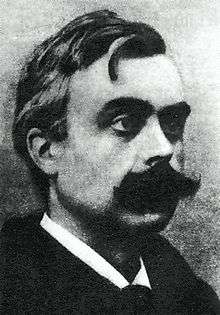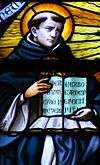Léon Bloy
| Léon Bloy | |
|---|---|
 Léon Bloy, 1887 | |
| Born |
July 11, 1846 Notre-Dame-de-Sanilhac |
| Died |
November 3, 1917 Bourg-la-Reine |
| Occupation |
|
| French literature |
|---|
| by category |
| French literary history |
| French writers |
|
| Portals |
|
Léon Bloy (July 11, 1846 – November 3, 1917), was a French novelist, essayist, pamphleteer, and poet.
Biography
Bloy was born in Notre-Dame-de-Sanilhac, in the arondissement of Périgueux, Dordogne. He was the second of six sons of Voltairean freethinker and stern disciplinarian Jean-Baptiste Bloy and his wife Anne-Marie Carreau, pious Spanish-Catholic daughter of a Napoleonic soldier.[1] After an agnostic and unhappy youth[2] in which he cultivated an intense hatred for the Roman Catholic Church and its teaching,[1] his father found him a job in Paris, where he went in 1864. In December 1868, he met the aging Catholic author Barbey d'Aurevilly, who lived opposite him in rue Rousselet and who became his mentor. Shortly afterwards, he underwent a dramatic religious conversion.
Bloy's works reflect a deepening devotion to the Catholic Church and most generally a tremendous craving for the Absolute. His devotion to religion resulted in a complete dependence on charity; he acquired his nickname ("the ungrateful beggar") as a result of the many letters requesting financial aid from friends, acquaintances, and complete strangers, all the while carrying on with his literary work, in which his eight-volume Diary takes an important place.
Bloy was a friend of the author Joris-Karl Huysmans, the painter Georges Rouault and the philosophers Jacques and Raïssa Maritain,[3] and was instrumental in reconciling these intellectuals with Roman Catholicism. However, he acquired a reputation for bigotry because of his frequent outbursts of temper. For example, in 1885, after the death of Victor Hugo, whom Bloy believed to be an atheist, Bloy decried Hugo's "senility," "avarice," and "hypocrisy."[4] Bloy's first novel, Le Désespéré, a fierce attack on rationalism and those he believed to be in league with it, made him fall out with the literary community of his time and even many of his old friends. Soon, Bloy could count such prestigious authors as Émile Zola, Guy de Maupassant, Ernest Renan, Alphonse Daudet, Joris-Karl Huysmans, Paul Bourget and Anatole France as his enemies.[3]
In addition to his published works, he left a large body of correspondence with public and literary figures. He died in Bourg-la-Reine.
Criticisms
Bloy was noted for personal attacks, but he saw them as the mercy or indignation of God. According to Jacques Maritain, he used to say: "My anger is the effervescence of my pity."[5]
Among the many targets of Bloy's attacks were people of business. In an essay in Pilgrim of the Absolute, he compared the businessmen of Chicago unfavorably to the cultured people of Paris:
"In Paris you have the Saint Chapelle and the Louvre, true enough, but we in Chicago kill eighty thousand hogs a day!..." The man who says that is in truth a business man.
Our Lady of La Salette
Inspired by both millennialist visionary Eugene Vintras and the reports of an apparition at La Salette—Our Lady of La Salette—Bloy was convinced that the Virgin's message was that if people did not reform, the end time was imminent.[7] He was particularly critical of the attention paid to the shrine at Lourdes and resented the fact that it distracted people from what he saw as the less sentimental message of La Salette.[8]
Influence
Bloy is quoted in the epigraph at the beginning of Graham Greene's novel The End of the Affair and in the essay "The Mirror of Enigmas" by the Argentine writer Jorge Luis Borges, who acknowledged his debt to him by naming him in the foreword to his short story collection "Artifices" as one of seven authors who were in "the heterogeneous list of the writers I am continually re-reading". In his novel The Harp and the Shadow, Alejo Carpentier excoriates Bloy as a raving, Columbus-defending lunatic during Vatican deliberations over the explorer's canonization. Bloy is also quoted at the beginning of John Irving's A Prayer for Owen Meany, and there are several quotations from his Letters to my Fiancée in Charles Williams's anthology The New Christian Year.[9] Le Désespéré was republished in 2005 by Editions Underbahn with a preface by Maurice G. Dantec. In Chile historian Jaime Eyzaguirre came to be influenced by Bloy's writings.[10]
According to the historian John Connelly, Bloy's Le Salut par les Juifs, with its apocalyptically radical interpretation of chapters 9-11 of Paul's Letter to the Romans, had a major influence on the Catholic theologians of Vatican Council II responsible for section 4 of the Council's declaration Nostra aetate, the doctrinal basis for a revolutionary change in the Catholic Church's attitude to Judaism.[11]
In 2013, Pope Francis surprised many by quoting Bloy during his first homily as pope.[3]
Bloy and his effect on 21st century French scholars make a significant appearance in Michel Houellebecq's 2015 novel Submission.
Works
Novels
- Le Désespéré (1887) ("Despairing")
- La Femme pauvre (1897) ("The woman who was poor")
Essays
- "Propos d'un entrepreneur de démolitions" (1884) ("The Munition Merchant's Plan")
- "Le Salut par les Juifs" (1892) ("Salvation through the Jews")
- "Je m'accuse" (1900) ("I accuse myself"), in response to Émile Zola's 1898 essay J'accuse
- "Exégèse des lieux communs" (1902–12) ("Exegesis of the Commonplaces")
- "Belluaires et porchers" (1905) ("Gladiators and swineherds")
- "Celle qui pleure" (1908) ("She Who Weeps")
- "Le Sang du Pauvre" (1909) ("Blood of the Poor")
- "L'Ame de Napoléon" (1912) ("Napoleon's Soul")
- "Sur la Tombe de Huysmans" (1913) "On Huysmans' Tomb")[12]
- "Jeanne d'Arc et l'Allemagne" (1915) ("Joan of Arc and Germany")
Short stories
- Sueur de sang (1893) ("Sweating blood")
- Histoires désobligeantes (1894) (Disagreeable tales)
Diaries
- Le Mendiant ingrat (1898) ("The Ungrateful Beggar")
- Mon Journal (1904) ("My diary")
- Quatre ans de captivité à Cochons-sur-Marne (1905) ("Four years of captivity in Cochons-sur-Marne")
- L'Invendable (1909) ("The Unsaleable")
- Le Vieux de la montagne (1911) ("The Old Man from the Mountain")
- Le Pèlerin de l'Absolu (1914) ("The Pilgrim of the Absolute")
- Au seuil de l'Apocalypse (1916) ("On the Threshold of the Apocalypse")
- La Porte des humbles (posth., 1920) ("The Door of the Lowly")
A useful study in English is Léon Bloy by Rayner Heppenstall (Cambridge: Bowes & Bowes, 1953).
Quotations
- "Love does not make you weak, because it is the source of all strength, but it makes you see the nothingness of the illusory strength on which you depended before you knew it."[13]
Notes
- 1 2 Alter-Gilbert, Gilbert (December 9, 2008). "Léon Bloy: Pilgrim of the Absolute".
- ↑ Sheed, F.J. (1940). Sidelights on the Catholic Revival. New York: Sheed and Ward. p. 181.
- 1 2 3 Bermudez, Alejandro (March 15, 2013). "A Pope Who Quotes Bloy". Catholic News Agency. Retrieved May 9, 2016.
- ↑ Robb, Graham (1997). Victor Hugo. London: Picador. p. 533.
- ↑ Bloy 1947, pp. 11, 13.
- ↑ Bloy 1947, p. 132.
- ↑ Ziegler, Robert (October 2013). "The Palimpsest of Suffering: Léon Bloy's Le Désespéré". Neophilologus. 97 (4): 653–62.
- ↑ Kaufmann, Suzanne K. (2005). Consuming Visions: Mass Culture and the Lourdes Shrine. Cornell University Press. p. 86. ISBN 9780801442483.
- ↑ "Quotations from Léon Bloy in "Charles Williams: The New Christian Year"". November 1, 2007. Retrieved July 21, 2014.
- ↑ "Jaime Eyzaguirre (1908–1968)". Memoria Chilena (in Spanish). Biblioteca Nacional de Chile. Retrieved December 30, 2015.
- ↑ Connelly, John (2012). From Enemy to Brother: The Revolution in Catholic Teaching on the Jews, 1933–1965. Harvard University Press.
- ↑ "Sur la Tombe de Huysmans" is available via Bibliothèque nationale de France.
- ↑ Auden, W.H.; Kronenberger, Louis (1966). The Viking Book of Aphorisms. New York: Viking Press.
References
- Bloy, Léon (1947). Pilgrim of the Absolute. New York: Pantheon Books.
External links
| Wikiquote has quotations related to: Léon Bloy |
| Wikimedia Commons has media related to Léon Bloy. |

